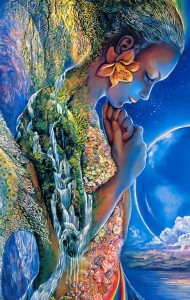Gaia (Gaea) is the primordial goddess of Earth who was known as “the Mother of All”. She was born from the gaping void named Chaos (which is mostly interpreted as “nothingness”) during the creation of the whole universe all.
The name Gaia is derived from the Greek word ‘ga’ (or ‘ge’) which means ‘land’ in ancient Greek.
After coming into existence Gaia gave birth to Uranus (the sky, the heavens), who will later become her consort, and Pontus (the sea).
It was believed that Gaia gave birth to Uranus and Pontus through agamogenesis, that is to say, without any kind of sexual intercourse with a male. Some myths also suggested that Gaia was born from Chaos with Eros. Eros and Tartarus were believed to be her brothers in the ancient ages.
The reason why Gaia was named as the Mother of All is related to her place in the Greek mythology as a mother figure.
Gaia married to her son Uranus and had many children with him such the Titans, Cyclopes and Hecatonchires. She gave birth to sea gods from her other son, Pontus and she gave birth to Gigantes (the Giants) and Typhon from Tartarus (a place which is known as “the pit of hell” and which is considered to be at the lowest level of earth below the kingdom of Hades).
She was also considered to be the mother of the Furies (‘Erinyes’ which means “the avengers” in Greek), three goddesses of divine vengeance who were believed to avenge crimes against gods and natural order of things, homicide in particular.
According to the myth, Uranus offended Gaia by imprisoning her children, Cyclopes and Hecatonchires (giant creatures with hundred hands in Greek mythology) in Tartarus. So Gaea devised a plan to overthrow Uranus and met with her sons including Cronus.
She tried to convince them to castrate their father but, motivated by his jealousy against his father’s power for ruling the cosmos (the universe), Cronus was the only son willing to do the deed. When Uranus came to meet Gaia, Cronus approached his father and castrated him.
The moment Uranus’ blood fell on Gaia, namely the Earth, after being castrated by his son is when the Furies were born.
With the emasculation of Uranus, Gaia, the earth and Uranus, the skies were separated resulting in no more monstrous offspring to be given birth by Gaia. It was believed she gave birth to her offspring from Pontus and Tartarus after this.
Some beliefs also suggested that all mortal creatures were also born from the earthly flesh of Gaia.

Ironically, Cronus was told that he would have the same faith with his father and be dethroned by one of his children.
Fearing this prophecy, Cronus swallowed all his children as soon as they were born until one day, his wife, Rhea was quite upset about this experience which was quite similar to what Gaia had with Uranus.
Rhea devised a plan with Gaia and Uranus to keep Cronus from eating her youngest child, Zeus and to raise him away from Cronus.
When Zeus grew up he confronted his father and saved all his siblings by making Cronus throw them up one by one.
As a punishment, Zeus banished Gaia’s Titan sons to Tartarus and offended Gaia, who actually helped him to stay alive and raised him (according to some versions of the myth). Gaia wanted to wreak vengeance on Zeus, so she gave birth and gathered a tribe of Gigantes and sent them to end the reign of Olympian Gods.
Her efforts ended in failure but that did not make her stop. She sent her last son, Typhon, who was fathered by Tartarus and who was known as “the father of all monsters” in Greek mythology, to slay Zeus.
Typhon hurt Zeus badly during the fight, however, aided greatly by Hermes, who healed Zeus’ wounds, Zeus defeated Typhon, ending in another failed attempt of Gaia to kill Zeus.
Gaia’s symbol is the Earth, trees and fruits since she is considered as “Mother Earth” in mythology. She was depicted in art mostly as a plump maternal figure in the form of a woman who is not able to separate her body from the earth. Gaia’s counterpart in Roman mythology is Terra (or Tellus).


